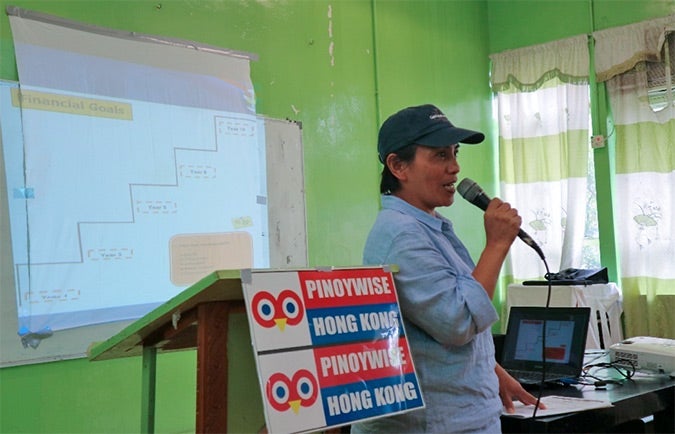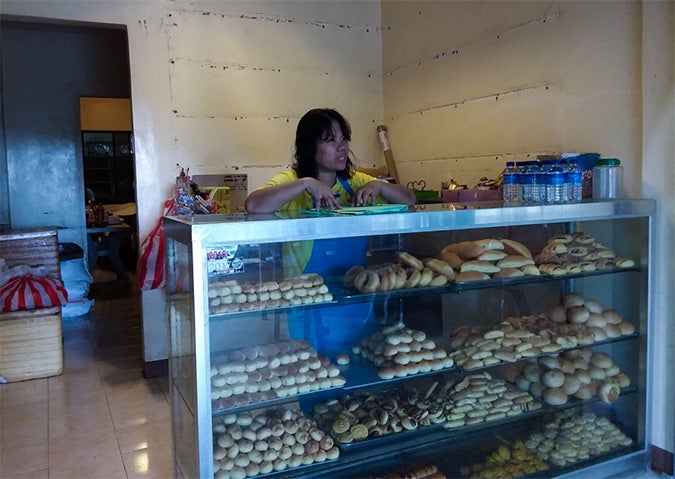After long years of work overseas, Philippines a migrant goes home and successfully sets up business
Date:
Author: Nuntana Tangwinit
Iloilo City, Philippines — Ellen Elecanal spent almost her entire adult life taking care of other people's families, a long journey of adaptation in three foreign countries. Now she's finally back home looking after her own family--but still trying to adapt, this time to a place no longer familiar after being away a quarter century.

Here in Iloilo province of central Philippines, Elecanal, 49 and single, tends the bakery shop she opened with her savings and lives with her brothers and their children. Business goes well, she has five employees and does retail more than 4,000 pieces a day, catering and wholesale.
Elecanal's story reflects the devotion and trials of the many thousands of migrant women who each year leave poorer countries of South-East Asia in search of work and better lives, and sometimes achieve them with a bit of help from UN Women Fund for Gender Equality.
As a young woman, Elecanal wanted to help her parents and her brothers but with only a secondary school education, she had limited options. She first did housework for a New Zealand family in Manila then followed them when they moved to India for six months and to the United Kingdom for two years. But Europe was too away-when her grandfather died, Elecanal found out only three months later. She returned to Manila and worked for an Australian family before following them to Hong Kong and staying there two years. After they returned to Australia, she worked for a British family in Hong Kong for two years. Then she moved with them to Singapore and stayed 20 years before finally making her way back home.

The worries that many female migrants like Elecanal have about the future have been eased by a programme called "Coming Home, Reintegration of Migrant Domestic Workers in the Philippines", supported by UN Women Fund for Gender Equality through the grant awarded focuses on. The 2016-2019 programme, run by Atikha Overseas Workers and Communities Initiatives, a Philippine non-governmental organization, works with overseas workers in Hong Kong and Singapore, two favored destinations for domestic workers from the Philippines. As of September 2017, Atikha had trained 600 of the women how to manage their incomes and plan their return home.
Atikha found that while most migrant domestic workers in Hong Kong spend eight years there working six days a week, they still did not have enough savings to return home. For those who did manage to save and fly back, 70 per cent of their new businesses ended up failing.
In 2015 Elecanal attended Atikha's workshops in Singapore on Family and Income Management, Reintegration Planning, Investment in Business and Entrepreneurship. It was her first time learning such things.
"For most of the Filipino migrants, we know how to spend but we don't know how to save," she said. "Through the training, I could distinguish 'need' and 'want'. That was the first step. I was educated to diagnose spending habits and that was the turning point … learning not to only spend the money but to make the money grow … I always think that investing in stocks is for rich people because I didn't know the process. Now I know that with 5,000 pesos (USD 100) I can also invest in the stock market."

In November 2016, her plan and investments organized, Elecanal moved back to Iloilo City and opened D's Daily Beli Bakeshop. At first it was hard running her own business for the first time. But she continued to receive entrepreneur skills training and support from Atikha, as well as its partners like the provincial employment office. Her bakery started turning a profit.
"I was away for so long, everything has changed," she said. "I struggled and I have to learn to adapt and adjust in my own family and doing business in a system that I am not familiar with. The training provided by Atikha equipped me with the needed tools."
Leonora Bing-Il is still abroad after 25 years, but she may follow in Elecanal's footsteps soon.
Bing-II left her rural Philippines home for Singapore in 1992 to do domestic work to support her husband and young daughter back home. After two years, she moved to Hong Kong, where she had heard that domestic worker salaries were higher and people friendlier to migrants.
Bing-Il took Atikha's financial training there, and her eyes opened.
"Reintegration with my family is a dream that has never happen in a decade and I stopped the dream," she said. "When I was handed the training kit, it sparked my dream again."
For further information
Please contact:
Estrella Anonuevo
Atikha Overseas Workers and Communities Initiatives Inc Email: [ Click to reveal ]
Web: www.atikha.org FB: [ Click to reveal ]
Nuntana Tangwinit
Fund for Gender Equality Regional Office for Asia and the Pacific
E-mail: [ Click to reveal ]
Web: [ Click to reveal ]
FB: UN Women Asia and the Pacific | Twitter @UNWOMENASIA